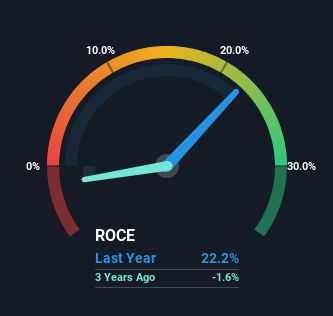- Greece
- /
- Oil and Gas
- /
- ATSE:MOH
Capital Allocation Trends At Motor Oil (Hellas) Corinth Refineries (ATH:MOH) Aren't Ideal

If we want to find a potential multi-bagger, often there are underlying trends that can provide clues. Firstly, we'll want to see a proven return on capital employed (ROCE) that is increasing, and secondly, an expanding base of capital employed. This shows us that it's a compounding machine, able to continually reinvest its earnings back into the business and generate higher returns. Having said that, while the ROCE is currently high for Motor Oil (Hellas) Corinth Refineries (ATH:MOH), we aren't jumping out of our chairs because returns are decreasing.
What Is Return On Capital Employed (ROCE)?
If you haven't worked with ROCE before, it measures the 'return' (pre-tax profit) a company generates from capital employed in its business. Analysts use this formula to calculate it for Motor Oil (Hellas) Corinth Refineries:
Return on Capital Employed = Earnings Before Interest and Tax (EBIT) ÷ (Total Assets - Current Liabilities)
0.22 = €1.2b ÷ (€7.7b - €2.1b) (Based on the trailing twelve months to September 2023).
Thus, Motor Oil (Hellas) Corinth Refineries has an ROCE of 22%. In absolute terms that's a great return and it's even better than the Oil and Gas industry average of 14%.
View our latest analysis for Motor Oil (Hellas) Corinth Refineries

In the above chart we have measured Motor Oil (Hellas) Corinth Refineries' prior ROCE against its prior performance, but the future is arguably more important. If you're interested, you can view the analysts predictions in our free analyst report for Motor Oil (Hellas) Corinth Refineries .
So How Is Motor Oil (Hellas) Corinth Refineries' ROCE Trending?
In terms of Motor Oil (Hellas) Corinth Refineries' historical ROCE movements, the trend isn't fantastic. While it's comforting that the ROCE is high, five years ago it was 28%. Given the business is employing more capital while revenue has slipped, this is a bit concerning. If this were to continue, you might be looking at a company that is trying to reinvest for growth but is actually losing market share since sales haven't increased.
In Conclusion...
In summary, we're somewhat concerned by Motor Oil (Hellas) Corinth Refineries' diminishing returns on increasing amounts of capital. Yet despite these concerning fundamentals, the stock has performed strongly with a 63% return over the last five years, so investors appear very optimistic. Regardless, we don't feel too comfortable with the fundamentals so we'd be steering clear of this stock for now.
If you'd like to know more about Motor Oil (Hellas) Corinth Refineries, we've spotted 2 warning signs, and 1 of them can't be ignored.
If you'd like to see other companies earning high returns, check out our free list of companies earning high returns with solid balance sheets here.
New: Manage All Your Stock Portfolios in One Place
We've created the ultimate portfolio companion for stock investors, and it's free.
• Connect an unlimited number of Portfolios and see your total in one currency
• Be alerted to new Warning Signs or Risks via email or mobile
• Track the Fair Value of your stocks
Have feedback on this article? Concerned about the content? Get in touch with us directly. Alternatively, email editorial-team (at) simplywallst.com.
This article by Simply Wall St is general in nature. We provide commentary based on historical data and analyst forecasts only using an unbiased methodology and our articles are not intended to be financial advice. It does not constitute a recommendation to buy or sell any stock, and does not take account of your objectives, or your financial situation. We aim to bring you long-term focused analysis driven by fundamental data. Note that our analysis may not factor in the latest price-sensitive company announcements or qualitative material. Simply Wall St has no position in any stocks mentioned.
About ATSE:MOH
Motor Oil (Hellas) Corinth Refineries
Motor Oil (Hellas) Corinth Refineries S.A.
Mediocre balance sheet second-rate dividend payer.
Market Insights
Community Narratives



